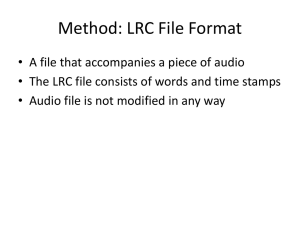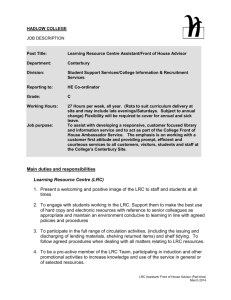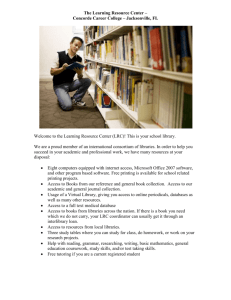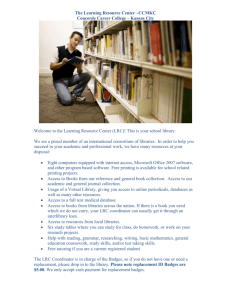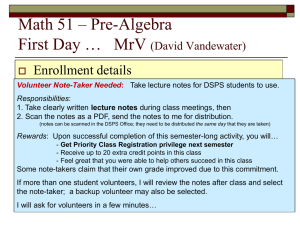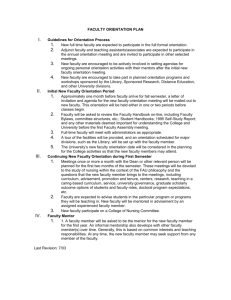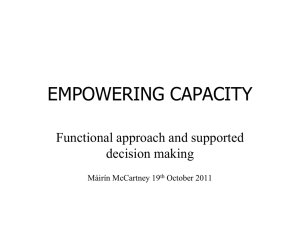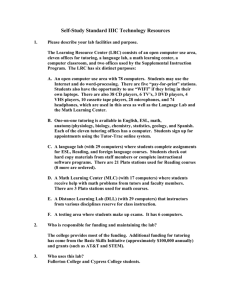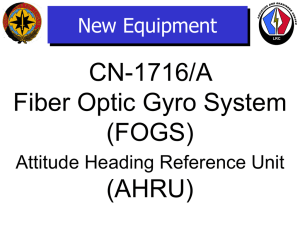Faculty Orientation
advertisement
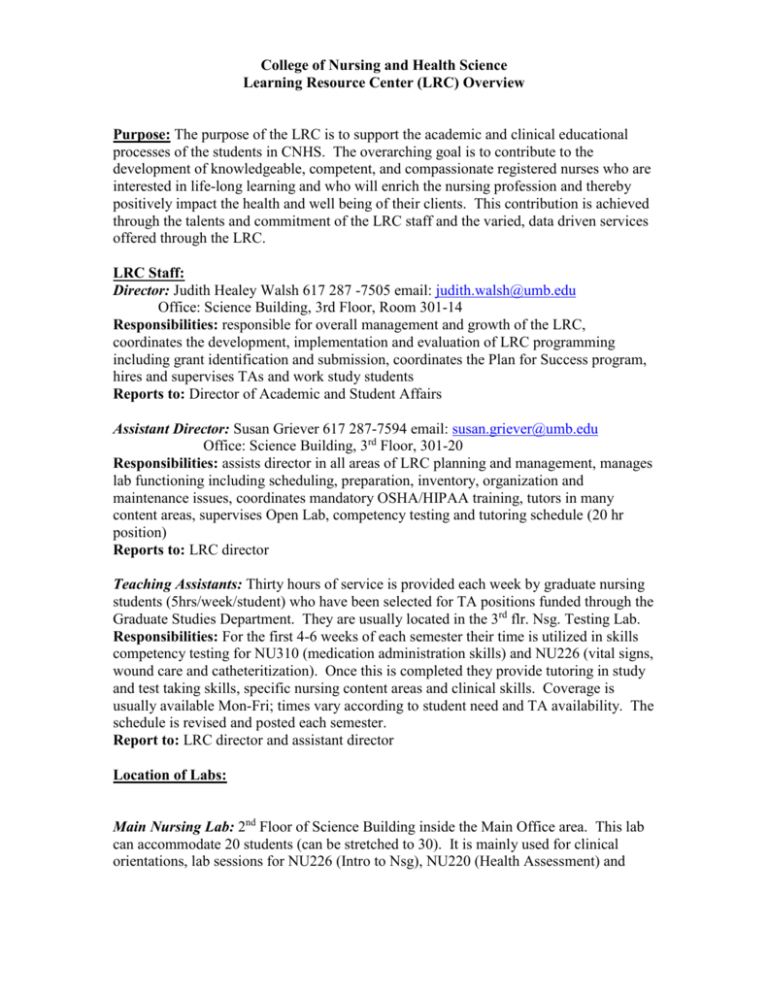
College of Nursing and Health Science Learning Resource Center (LRC) Overview Purpose: The purpose of the LRC is to support the academic and clinical educational processes of the students in CNHS. The overarching goal is to contribute to the development of knowledgeable, competent, and compassionate registered nurses who are interested in life-long learning and who will enrich the nursing profession and thereby positively impact the health and well being of their clients. This contribution is achieved through the talents and commitment of the LRC staff and the varied, data driven services offered through the LRC. LRC Staff: Director: Judith Healey Walsh 617 287 -7505 email: judith.walsh@umb.edu Office: Science Building, 3rd Floor, Room 301-14 Responsibilities: responsible for overall management and growth of the LRC, coordinates the development, implementation and evaluation of LRC programming including grant identification and submission, coordinates the Plan for Success program, hires and supervises TAs and work study students Reports to: Director of Academic and Student Affairs Assistant Director: Susan Griever 617 287-7594 email: susan.griever@umb.edu Office: Science Building, 3rd Floor, 301-20 Responsibilities: assists director in all areas of LRC planning and management, manages lab functioning including scheduling, preparation, inventory, organization and maintenance issues, coordinates mandatory OSHA/HIPAA training, tutors in many content areas, supervises Open Lab, competency testing and tutoring schedule (20 hr position) Reports to: LRC director Teaching Assistants: Thirty hours of service is provided each week by graduate nursing students (5hrs/week/student) who have been selected for TA positions funded through the Graduate Studies Department. They are usually located in the 3rd flr. Nsg. Testing Lab. Responsibilities: For the first 4-6 weeks of each semester their time is utilized in skills competency testing for NU310 (medication administration skills) and NU226 (vital signs, wound care and catheteritization). Once this is completed they provide tutoring in study and test taking skills, specific nursing content areas and clinical skills. Coverage is usually available Mon-Fri; times vary according to student need and TA availability. The schedule is revised and posted each semester. Report to: LRC director and assistant director Location of Labs: Main Nursing Lab: 2nd Floor of Science Building inside the Main Office area. This lab can accommodate 20 students (can be stretched to 30). It is mainly used for clinical orientations, lab sessions for NU226 (Intro to Nsg), NU220 (Health Assessment) and NU310 (Adult Health I), exam reviews, supervised clinical practice sessions (open lab) and workshops. Nsg. Testing Lab: 3rd floor of Science Building : 301-41(area where faculty offices are located), middle corridor next to the Office of Urban Family Health. It is primarily used by the TAs for competency testing and tutoring. NP Lab: 3rd floor of Science Building in the Math/Computer Science area: Rm 143 (Directions are posted on the bulletin boards and doors outside of the CNHS main office). It is used primarily for Advanced Health Assessment Labs (fall semester); supervised clinical skills practice sessions, clinical conferences and smaller workshops. These rooms are constantly utilized. Any request to schedule use of lab should be emailed to the LRC assistant director with as much advance notice as possible. Lab sessions for NU226, NU220 AND NU310 and already scheduled workshops take priority. Although every attempt is made to accommodate requests, space is limited and may not be available at the time requested. Faculty who are utilizing any lab please refer to the handouts which outline location of supplies, clean up and maintenance rules for students and faculty. Services Offered Supervised Clinical Skills Practice Sessions Clinical Skills Competency Testing Remediation/Enhancement of Clinical Skills Individual/Group Tutoring in*: Study Skills Test Taking Skills Growth and Development Intro to Nursing Health Assessment Pathophysiology Adult Health Nursing Pharmacology Limited availability for writing assistance and paper research process Care plan development * students in these courses utilize the most tutoring services but students in any nursing course may sign up for tutoring Workshops in: Study Skills Test taking Skills Nursing Process and Care plans Faculty can request that a workshop be developed and scheduled specifically for their class. Ability to fulfill these requests is based on space and LRC staff availability. Video Library: Over 400 videos are available to enhance the students’ learning. Faculty may reserve and borrow these videos to view at home and present in class. Videos are located in the 3rd Flr Nursing Testing Lab. If you know that you want to use a video on a specific date anytime during the semester, you may reserve it in the log book in the lab and then pick it up on or just before the showing date. Faculty may request that a video be scheduled and available for students to view in the lab (based on the lab availability), 2/wk for 1-2 weeks. LRC staff will post the times of these sessions on the appropriate course bulletin board. Students may request to view videos but cannot borrow them. Supplemental Lab sessions: If there are concepts or topics in your course content that could be more effectively understood through simulation or hands on learning stations you may discuss the feasibility of collaborating with the LRC to design and implement the lab for students in your course. Plan for Success Program: Students on probation meet with an LRC staff member or a student affairs specialist to complete an assessment of the barriers to learning, learning style and academic habits and develop a plan for success which is monitored throughout semester. The student affairs committee (SAC) has identified the following criteria to warrant faculty member, advisor, administrator or student affairs specialist to refer a student to the Plan for Success Program: Lab Science failure Pattern of withdrawal while failing, in 2/more req. nsg. courses Failure to meet academic progression requirements 2 or more warnings in the same semester HESI below 850 Failing the Writing Proficiency Exam Who can refer students? Students can self refer. Clinical and classrooms faculty, advisors, administrators, and student affairs specialists can all refer any student that they believe will benefit from assistance through LRC. Analysis of the risk program has demonstrated that being proactive and identifying and referring students early in the semester proves more beneficial and increases the success rate. What are some of the reasons why I would refer a student? Clinical Reasons: Difficulty organizing and prioritizing care Problems with care plan development Lack of progress or regression with skills attainment Difficulty communicating with patients and/or staff Inadequate documentation skills Difficulty with medication administration Student receives a failure warning Classroom Reasons Poor attendance Poor quiz and test grades Poorly developed writing skills Questionable study skills Difficulty with note taking Inability to critically analyze reading materials Poor quantitative skills How do I refer a student? There is a brief referral form that you need to complete. An electronic version will be emailed to you at the beginning of the school year. Hard copies will be available at faculty orientation and the first faculty meeting each semester. The easiest way to refer a student is to complete the form electronically and email it to the assistant director (susan.griever@umb.edu )and print a copy to give to the student. If you are at clinical and cannot easily submit it electronically, give a written copy to the student to bring to the LRC when they schedule their appointment. You can also put a form in her mailbox. Please feel free to call her (617 287-7594) about any problem or referral that you feel needs to be discussed. How does the process work? The student referred will be assigned to an LRC staff member based on their type of learning need and their time availability. The tutor will document the problems identified, progress, and recommendations for each session. A summary of this will be sent to you (if you have referred the student) either through the student or by email. It is helpful for you to email back to the tutor any progress and also any specific areas that need continued work.
